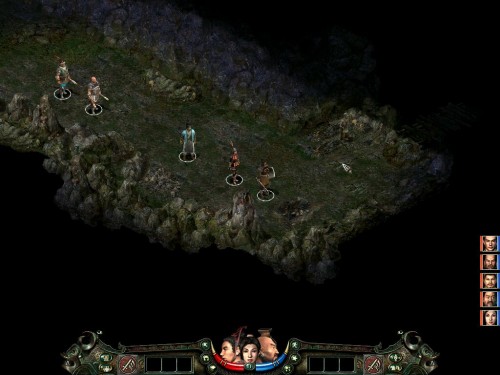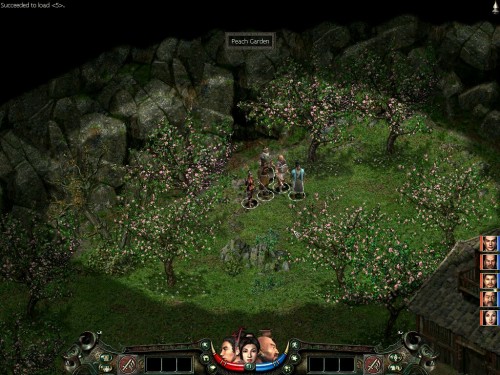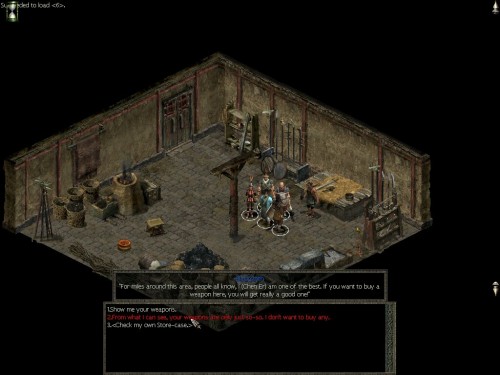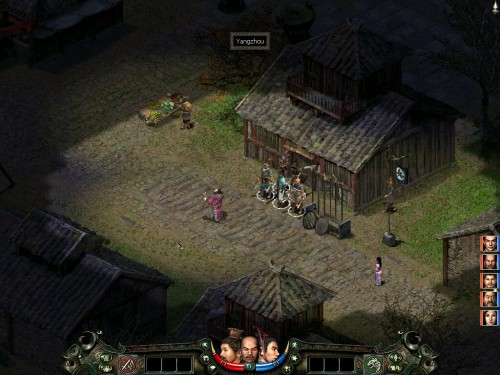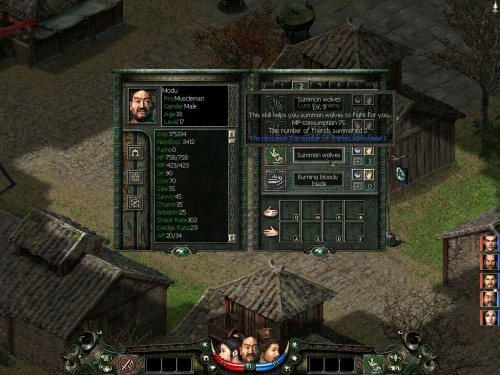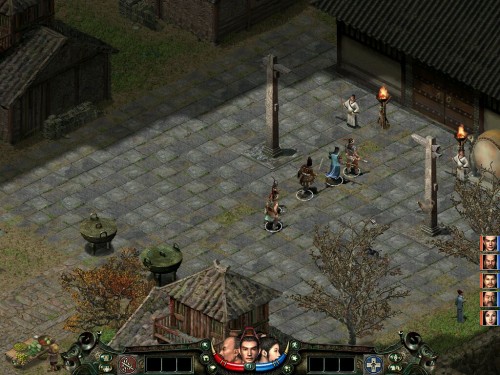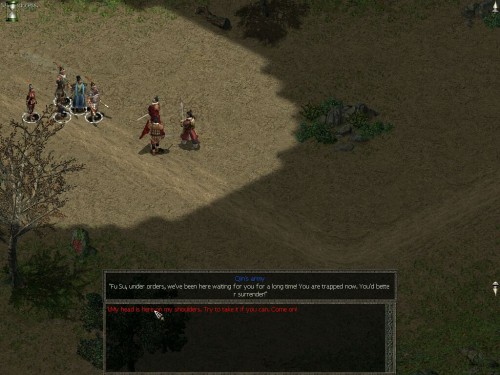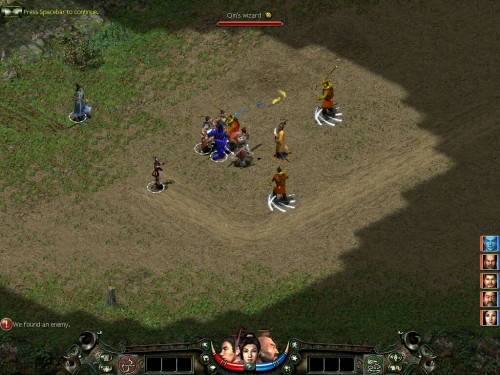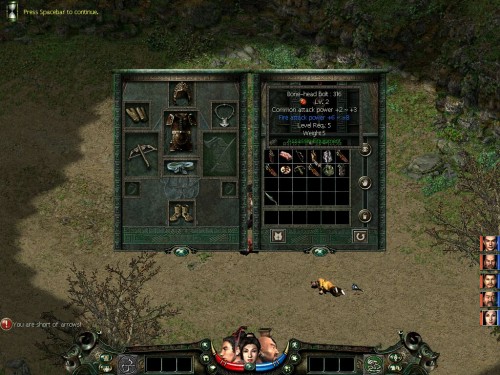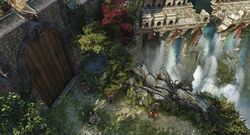Prince of Qin Review
Prince of Qin Review
Codex Review - posted by Saint_Proverbius on Fri 3 January 2003, 18:49:53
Tags: Object Software; Prince of QinFinally, a Chinese CRPG
It's something I've always wanted, frankly. I play lots of CRPGs, and most of them pretty much stick to the standard Celtic/Nordic fantasy style setting without really offering much in the way of something you really haven't seen. Sure, some of the action CRPGs these days explore other settings, like Throne of Darkness did with feudal Japan, or like Harbinger is doing with their sci-fi setting. Other than waving around the setting's weapon of choice, most action CRPGs don't allow you to actually explore that setting.
Prince of Qin offers a fairly nice glimpse of the ancient Chinese setting, filled with folklore, etiquette, elemental beliefs, historical Chinese figures, and so forth, which make it a very rich and different setting to explore and flesh out.
Five Elements and other things
On par with the Chinese theme of the game, Prince of Qin uses the concept of the Chinese Five Elements system. Many things in the game have an elemental alignment, including items, characters, and enemies, which makes knowing this system very important to the game.
The Five Elements are Water, Wood, Metal, Earth, and Fire. Each of these elements has a relationship with two of the others, one which promotes it and one which restricts it. While this may be confusing to some at first, many of the relationships make sense. Wood, for example, is promoted by Water and restricted by Fire. Naturally, most people should know that trees need water to grow and fire does nasty things to them.
The belief in the Five Elements system manifests itself in the game mechanics in a number of ways. For example, one elementally aligned item can push another elementally aligned item if the first promotes the second. If you have a weapon in your hand that's based on Fire, and a ring on that hand that's Wood based, abilities in that weapon will be unlocked because Fire is promoted by Wood. Likewise, a necklace with a Metal alignment can promote a helmet with a Water alignment, and so on.
Because of this item interaction based on the Five Elements, and the nature of items, Prince of Qin somewhat enforces using item themes if you really want to get the most out of your items. You can choose to ignore this, and you'll still be able to make it through the game, it's just not as easy for those combat situations.
Also, because of the nature of restrictions in the Five Element system, some enemies may be tougher or easier for you based on their and your elemental alignment. A Wood aligned character is going to have a much harder time overcoming a Fire aligned creature than he or she would have against a Water aligned one.
In fact, you may think your character is a pretty tough character. You may think he or she is extremely powerful in combat and that may be true - until he meets up with something of an alignment that restricts his or her alignment. He'll have trouble doing damage to that creature while the other creature will be doing significant damage to him. Like Sun Tzu said, Overconfidence in your own ability is a mistake.
The nice thing about this system is that it encourages party tactics. You may have to pull your favored MuscleMan out of combat with a certain foe because the elemental alignment restricts that of the MuscleMan. In this case, it's much better to use a different character to go after that enemy and find another target for the aligned character.
Classes, jobs, and things of an occupational nature
Prince of Qin has five classes; Paladin, Muscleman, Witch, Wizard, and Assassin. You may know the class names from other CRPGs, but you may be surprised at what they actually do since they're the Chinese idea of them rather than the more traditional European faire.
A Paladin isn't a holy knight who takes his orders and power from the divine, for example. He's more of a warrior who comes from a background of nobility. As such, he has the artisan ability to forge weapons and repair items should you choose to develop those skills. The paladin primarily fights with either bow or sword and shield, and has a number of skills that augment those abilities for himself.
The MuscleMan is basically a wild barbarian of sorts, with a few spell-like abilities. He's skilled with most weapons other than swords and ranged, and can dual wield the one handed weapons naturally. In addition to his weapons powers, the MuscleMan is tuned towards nature and can tame and summon animals to assist him. A MuscleMan also has the ability to augment other troops similar to the Paladin as well as strike fear in enemies, making them weaker. In addition to that, the MuscleMan also has the ability to use natural forces to do damage to enemies.
Assassins can be thought of as a cross between the D&D style Rogue and Diablo 2's Assassin. Like the Paladins, they can use both ranged and melee fighting. However, Assassins are limited to smaller bladed weapons, like daggers and short swords, but can also use any type of bow. Assassins are also capable of doing your typical thieving skills, such as picking locks and disarming mechanical traps. Like in Diablo 2, Assassins can also set traps, spelling fun and mayhem for all those nasty critters on patrol. Assassins can also use mystical skills to augment their attack abilities.
A Wizard is pretty much what you'd expect if you're thinking of him as the generic spell caster type. However, along the lines of the Chinese Five Elements, most of his spells are that of an elemental nature. In addition to striking down foes with elemental magic, Wizards can also heal themselves and party members as well as augment the party in a variety of ways, making them a useful addition to any party. Unlike the typical Wizards in most games, this class is also a viable fighter with a staff and has several skills that can improve this ability. Staff fighting using certain skills can also restore mana for the Wizard.
The Witch class is a magic using class as well. While the Witch has elemental attacks like the Wizard, the Witch has fewer of them and most of her spells tend to be more of a curse the enemy style magic. Also, like the Wizard, a Witch can be skilled with melee, but her attacks will absorb and restore hit points rather than mana.
Build strong character
The character system in Prince of Qin is mostly straight forward. Like most CRPGs, the system involves personal attributes, which are the characteristics of your body. It also has skills, but all those are class based and briefly touched on above.
The attributes in the game are Strength, Endurance, Dexterity, Charm, savvy, and Wisdom. Most of these do what you'd expect them to do, with the exception of savvy which determines the rate at which you can gain experience. Charm affects how people see you, which could give you better prices in shops as well as influence certain dialogue options and quests.
At each level up, called "upgrading" in this game, characters are given ten points to raise their attributes and raise a skill level one point. If you're familiar with Diablo 2 or Divine Divinity, this method of levelling up should be straight forward since it's so similar in mechanics to those games. The main difference is that you have more attributes in Prince of Qin. As you gain in level, you have more access to skills, which is also standard faire from those two games.
While this system may sound rather simple at first glance, beyond what you can change are a large number of secondary attributes which are determined by those attributes. Dexterity, for example, can affect Dodge Rate as well as Shoot Rate. One handy thing about these is they're all available for the player's inspection via the character screen.
Back to feudal China
The setting takes place in ancient China, shortly after the death of the First Emperor of the Qin Dynasty. Allegedly, the Emperor sent an edict to his son, Prince Fu Su, for him to kill himself. In history, Fu Su did this without question. He got the order, and he obeyed it.
In the game, Prince Fu Su gets curious instead, and wonders why his father ordered this and if the order is even legitimate. So, Fu Su sets out in the world to find answers, which may be tricky to get since his father is already dead. Not only that, but because Fu Su is defying an order from the First Emperor, he's being hunted as well.
In order to move through this setting without being seen, Fu Su abandons his royal armor and weapons and begins his journey with little more than rags. That's the background of the game. That's how it all starts.
Unfortunately, you are Fu Su in the game. Fu Su is a Paladin. You're not allowed to make a character yourself, so you're stuck starting the game as a Paladin and as Fu Su. I really would have preferred that they had done one of two things. Either allowed you to change your name, since Fu Su needs to stay hidden, and pick a class, or another nice route would be if it had given you the option of generating a fictional friend of Fu Su and playing that way. While there are a lot of options that can be had from being a Paladin, I'd rather have that choice of being what I want to be.
Along the way, you'll run in to some fairly important historical figures from China's past. Some of these are Fu Su's long time friends. Some of them are out to get Fu Su because they know if he's alive, he's a threat to their power. Then there's the historical NPCs who just don't like the Chinese, such as a certain Khan Chieftan who isn't that fun to play with.
In addition to key historical figures, the player will also be presented with a number of common monster types taken from Chinese folklore. You'll see everything from terra-cotta soldiers to tigerfish to large baboon man type beasts with various names.
In addition to the figures, you'll also come across several people who will teach you the writings of the scholars of the time. While this may not seem that significant, these teachings can be put to use by Fu Su later on in the game when dealing with certain problems involving such knowledge. It not only shows you an example of the works of the Chinese, but it plays out in the mechanics of the game as well, which is an extremely nice touch.
Even the dialogue seems like a typical kung fu movie, which I've heard wasn't the intend of the developers and they aren't pleased with it. However, I found it rather charming since, like I said, it sounds like a typical kung fu movie dub. However, I think the translation team did a pretty fair job with it, since I haven't noticed anything totally devoid of English writing skills and word order. The mixture of British and Hong Kong Chinese voice acting may not be on par for some, but I thought it carried itself well.
One thing you might notice is that while the game is rich in the Chinese setting, you don't have to worry about learning the names of weapons or of the classes. Most of the names of the items are the western equivalent, so you don't have to worry about looking up the names of items. This was one of the big problems I had with Throne of Darkness, all the weapons had Japanese names. I prefer greatly to have names of things I can understand by reading them, rather than the Chinese word for them written out in Roman lettering. After all, if the speech is all translated in to English, why wouldn't the names of the weapons be as well?
However, even though the names of the weapons are in English, they still manage to convey the theme of the game. For example, one of the nicer swords you'll find early in the game is the Spring and Autumn Sword. Even the skills in the game follow this theme. For example, one of the MuscleMan's defensive skills is Copper Skin and Iron Bone, which conveys what it does well while following the theme. It's a very nice way of handling things, by keeping the theme and converting it to the English language.
The ancient art of making things dead
Combat in Prince of Qin is also straight forward. It can best be summed up as a mix of Diablo 2 and Baldur's Gate's combat. The system is real time with pause, but also adds the Diablo 2 style right click actions. This works fairly well, since it even works when all members are selected.
If you have the left click skill assigned to an attack type for everyone while they're selected, and click on an enemy, they'll do what you expect. They'll all run in to battle against that target. If you assign the right click skill for everyone as some sort of augmentation spell, you can right click and watch everyone power themselves up. This works nicely because it actually cuts down on the need for pausing so long as you have everyone set up with a common theme on skill choice.
Like the Infinity Engine games, you're allowed to set up auto pauses upon certain events. The start of combat, health of a character being low, and so on, are examples of events where the game can be set to auto pause should you select them in the game's options panel.
Unlike the Infinity Engine games, the pathfinding in Prince of Qin is fairly solid. This means you won't have to constantly pause to make sure your guys are moving where you want them to move, nor will they trip over themselves and stop on the way to a target. Your party will nearly always find a route to that target, even if they have to go around one another to find an opening.
The enemy AI is fairly solid as well. Ranged foes will tend to try to avoid being close to your melee people and move to get vantage on your party. Intelligent enemies will panic if they take too much damage, and retreat, whereas animals and monsters typically won't. Spell casters will attempt to delay and obstruct your advances, followed by peppering your party with damage based spells.
Unfortunately, combat suffers from the same thing nearly all real time with pause systems suffer from, it's passive. Unless something goes wrong, there's very little to do other than watch the combat unfold. Combat options are really only required when facing things roughly as powerful as your party, so most combat is merely watching, but at least it's over quickly.
When you are facing tougher opponents, there are a number of nice options. Passing supplies around in combat is as simple as opening up a character's inventory and dragging it to a party member's portrait. As mentioned above, you can make use of the mass right click feature to boost your party to become a match, hopefully, for what's causing you problems.
Another interesting addition to the combat is that you can't just keep pausing, eating some health giving food, and repeating this until the enemy is dead. After you eat something that gives you health, there's a set time before you're allowed to eat again. In other words, health supplies won't make you immortal, so you have to rely on both tactics as well as spells in order to win some fights.
Do it yourself item forging
Of course, this is one of the Paladin skills in the game. However, it's done so well that I figured it deserved it's own section. Although, if you're playing multiplayer and don't have a Paladin around like you do in the single player, you can always have a black smith make items for you. This might also be a good idea early in the game, when you're not as skilled at forging, but really need that item.
Almost every item type in the game can be forged, it's merely a matter of having your skill high enough to do it. It's also a matter of having the right parts to make that item. There are several types of parts in the game. You have bones, skins, and tendons, which animals occasionally drop when they die. You have wood, which you can find in certain trees. Lastly, there's ore, which you can find in certain rocky outcroppings.
Some of these parts contain magical properties and some have elemental alignments. These properties and alignments translate to the properties of the item you're making. For example, if you have a few bones with fire aligned properties, the necklace you make from them will most likely be fire aligned as well. Remember the section on the Five Elements? The best way to get a promoting item is, if you have the parts, forging it yourself. Of course, you can search shops and hope to find what you need, but that can take some doing and isn't nearly as fun as making them yourself.
What parts you need also depends on what you want to make. Chest armor, for example, requires three skins and two pieces of ore. Necklaces require two bones and one ore.
Additionally, items can be inlaided with gems, stones, amber, and other things that might also contain magical properties to further enhance them. The amount of gems that you can put in an item is limited to the amount of enhancements already on the item, so you can't just pile them on there and have a super weapon, armor, or other item. Also, just about every item can be socketted.
About the only problem you'll have with this is finding all the ingredients you may need. Some areas are fairly rich in trees and rock groupings that contain wood and ore, but most of them aren't. Animals don't always, or even often, drop skins. You may find yourself with a huge cache of bones and tendons though.
Also, what you can make from the beginning isn't all you can make. There are people throughout the game which will teach you how to make other items, such as leather coats and fishing rods, which you can use for various quests or just to sell.
And now, everything else
I think the most important thing to mention is that this game isn't really a Diablo 2 clone. While it shares some similarities in terms of the character system, item generation, and the ability to socket items, these are largely overshadowed by how the game actually plays. Most of the game isn't about delving deeper and deeper in to dungeon after dungeon to find a demon to slay.Most of it is about uncovering conspiracies, helping out common folk, learning and growing as a character, and so on.
Prince of Qin, despite what most reviews have labelled it as, has very little to do with Diablo 2 at all. There are a huge amount of quests that don't involve fighting at all, but tend to involve learning abilities to make things for people, working out problems people are having with various things, and so on. I found that a lot of my time in the town locations involved dialogue with the people rather than combat, which I feel provides a much better CRPG than simply one that's mostly combat.
In fact, to encourage the player to talk to people, you'll sometimes be rewarded for talking to an elder or scholar, since they will teach you bits of Chinese philosophy, tactics, or some other interesting knowledge. Just talking to these type of people can yield bonuses to attributes and skills in the game. They also may give you a book on Chinese knowledge, which can have an impact on your character's abilities if you read it.
That's not to say there's not combat in the game. There are locations that are rather unfriendly towards your character. There are a few places where you'll have to recover something from a cave or a tomb that's been infested by animals, both mythological and real world types. Most of these areas are fairly well done. However, in some areas, monsters will respawn which can make for some irritating circumstances. Fighting your way in is generally acceptable. It's fighting your way out that can be annoying.
Going through the world of ancient China in the game can be confusing. Quite often, you're not really sure where to go or what to do to complete a chapter in the game. At least, I wasn't sure at times. After much stumbling around, I could eventually figure out what to do. Unfortunately, the game blocks off areas from you until you complete certain chapters as well, which gives a constricted feel about it. You're free to go where ever you want in the part you have access to be in, however.
The game is generally good about keeping you immersed in the story of Fu Su. However, there are certain events which occur in the game, where a conversation between Fu Su and other characters takes place in cut scenes, with entirely scripted dialogue. You go from controlling Fu Su to watching Fu Su talk to others. While these are fairly rare, it would have been much nicer if they'd done those plot pieces and still allowed you to have control over the dialogue instead of passively watching your character talk with an NPC.
The multiplayer part of the game, unlike the single player, does appear to be of a Diablo-ish nature. It's basically the single player, only with much less dialogue and scripting, and many more combat zones. You'll only control one character, but the game still allows you to pause it in order to trade items, upgrade your characters, and so on, without fear of getting killed by the constantly respawning monsters. There is also a downloadable match making client available, for those who want quick pick up games without going through the trouble of gathering up people they know who have the game.
Object Software is also updating the game, including enhancements to the multiplayer.
Summing up
Prince of Qin is a very nice CRPG for those who are looking for something different to play, other than D&D CRPGs or the traditional fantasy setting. In keeping with Chinese lore and tradition, the setting offers gameplay that's not too different from other CRPG settings that a new player will be confused by everything, but it does offer a highly unique flavor.
Most of the game's mechanics are fairly sound and consistent, with the exception of some of the cutscenes. The ability to make items in this game is very well done, including how the resources required for making items affect the item itself, as does your skill level. The craftsmanship on the setting was handled very well by the developers at Object Software who appear to specialize in making games with an ancient Chinese setting, such as their RTS game, Fate of the Dragon.
While the game does have some faults, many of the features of the game and the setting overshadow these. If you've been waiting for a CRPG set in the vast lore of ancient China, you'll probably enjoy this. If you're looking for a solid CRPG that doesn't force you to kill everything in order to get to the next level, then you might want to take a gander at this one.




